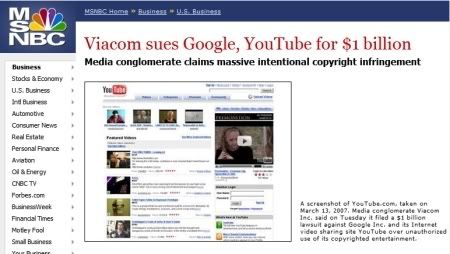Viacom sues Google & YouTube for US$ 1B
Technorati tags: Media, Google, YouTube, Viacom, Lawsuit, Paradigm Shift
Walski figured this would happen sooner or later (reported via MSNBC.com).
 Click on image to view full report
Click on image to view full report
On the surface, it appears that the old media resistance continues, despite evidence that the Gen-Next platform for broadcasting is definitely online, via the Internet, in a collaborative environment, versus the old exclusivity way. Some paradigms refuse to change, and try to cling on tooth & nail to the familiar. It's oh so 20th century...
Viacom, is of course the media conglomerate that owns, among other things, MTV (and its stablemates MTV2, VH1, etc.), and Comedy Central, two media arms whom have had their materials (lots of it) uploaded to YouTube. The claims Viacom are making are based on copyright infringements.
But sratch the surface a little, and the reality of it is that copyright is not what it's all about entirely. It's probably advertising revenue, for one. Comedy Central, for example, hosts clips from it's shows (like the popular The Daily Show, with Jon Stewart, and another of Walski's favorites South Park) for free viewing, but with advertising. And is the US$ 1B claim justified? Hard to say - how do you quantify potential losses due to what an audience may (or may not) want to watch?
On a Forbes.com video report, analyst Peter Kafka states that Viacom has more to lose, compared with CBS or NBC, among others whom have since reached hosting agreements with YouTube.
(more old media vs. new media, in the full post)
Whereas where CBS and NBC typically run full-feature programs, snippets of which get uploaded to YouTube, the cannibalization of materials from the Viacom stable consist of clip-length segments, or music videos (which are typically 3 - 6 minutes long), which fit nicely into the constraints that YouTube sets.
With these sort of blanket publishing right agreements, YouTube pays the media conglomerates a certain sum of money (in the hundreds of millions) to enable them to potentially host materials owned by the conglomerates, and in the process, absolving YouTube of any legal implications.
Kafka thinks that at the end of this suit, what is likely to happen is a settlement, or even more likely, a similar agreement like the ones made with CBS and NBC. The only question being how much - but definitely not the US$ 1B being asked for.
Google & YouTube, however, are not worried. In response to the suit, Google/YouTube issued a statement stating that digital liability law (per the 1998 Digital Millennium Copyright Act ) protects them in this case (reported via CNNMoney).
And this suit is definitely not making Google regret its US$ 1.65B acquisition of YouTube last year. On the contrary, Google is now probably more determined to make its mark in helping shape the Gen-Next broadcast platform.
Implications back on home soil?
It is high time traditional media, and media regulators, realize that the archaic turf-protection of materials, copyrights and censorship are slowly dwindling away. Sure, intellectual property rights remain important, but the enforcement of these rights, and the laws regulating them, cannot remain in the physical media age they were drafted in. Walski, however, thinks that we still have a long journey ahead of us - and one that is destined to be bumpy.
As it is, many of our politicians can't even come to grips with the open reporting that the Internet has paved the way for. The recent foot-in-the-mouth incident, and continued curtailing of citizen's expression (banning of Amir Muhammad's "Apa Khabar Orang Kampung", for instance ) are all testaments to this.
The ever-advancing technologies via the Internet are definitely changing the way news is being reported, the contents of news, and the need (more than ever) for a platform of openness and full disclosure. And it's probably this that our politicians, still caught in the archaic paradigms of the late 20th century, are truly afraid of. It lays them bare, opening them up to full-frontal scrutiny.
The walls behind which to hide are slowly crumbling, like it or not.
















